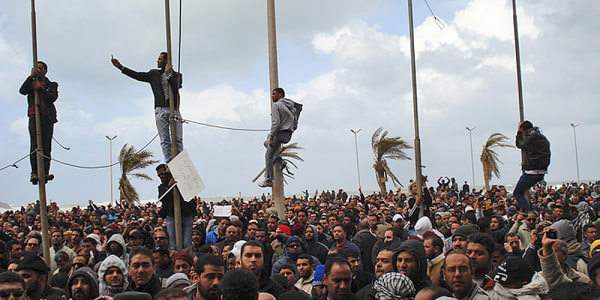The leaders of Britain, France and the United States vowed on Friday to keep up their military campaign in Libya until Moammar Gadhafi leaves power, while forces loyal to him continued attacks on Libyan towns.
President Barack Obama said the embattled Libyan leader was "getting squeezed in all different kinds of ways," asserting he was running out of money and supplies. The president told The Associated Press that he was confident that Gadhafi ultimately would be forced to surrender power and that there was no need for a change in U.S. policy at this time.
Obama also said he didn't see a need to resume direct U.S. participation in enforcing the no-fly zone, saying it was assisting its NATO allies with intelligence, communications jamming and refueling.
The president's comments followed a strongly worded, jointly written opinion article published Friday in newspapers on both sides of the Atlantic by Obama, British Prime Minister David Cameron and French President Nicolas Sarkozy. The article said that leaving Gadhafi in power would be an "unconscionable betrayal" of the Libyan people.
"It is unthinkable that someone who has tried to massacre his own people can play a part in their future government," the leaders wrote.
"So long as Gadhafi is in power, NATO and its coalition partners must maintain their operations so that civilians remain protected and the pressure on the regime builds," they said.
"Then a genuine transition from dictatorship to an inclusive constitutional process can really begin, led by a new generation of leaders. For that transition to succeed, Colonel Gadhafi must go, and go for good.
"Britain, France and the United States will not rest until the United Nations Security Council resolutions have been implemented and the Libyan people can choose their own future," they wrote.
The article by the Western allies appeared at a time when diplomatic efforts have been made to paper over divisions between NATO allies about how intensively they should prosecute the three-week-old air war.
Al-Jazeera English reported Friday that a small British military team is on the ground in Libya advising rebels on how to organize their command structure.
U.S. Secretary of State Hillary Clinton said that NATO allies were searching for ways to provide funds to Libya's rebels.
"The opposition needs a lot of assistance, on the organizational side, on the humanitarian side, and on the military side," Clinton told reporters after a meeting of NATO foreign ministers.
"There have been a number of discussions about how to best provide that assistance ... who's willing to do what. We're also searching for ways to provide funding to the opposition."
StalemateThe situation on the ground has edged toward a tense stalemate.
Forces loyal to Gadhafi killed seven rebel fighters and wounded 11 in attacks on the town of Yafran in western Libya on Friday, a rebel spokesman told Al Jazeera television. Yafran is part of the Western Mountains region, an area inhabited by Berbers who are ethnically distinct from most Libyans.
Gadhafi troops also unleashed heavy shelling Friday on Misrata, pushing troops and tanks into the rebel-held western city, a witness said.
Elsewhere, NATO warplanes struck Gadhafi's hometown of Sirte in the east, and
the area of al-Assah, about 105 miles west of Tripoli, Libyan state television reported.
A helicopter circled over Misrata for several hours, apparently spotting targets for artillery in Libya's third-largest city, in defiance of the NATO-enforced no-fly zone. Pro-Gadhafi forces bombarded the city with fire from tanks, artillery and rockets, residents said.
Slideshow 81 photos
Libya's uprising against Gadhafi
Eight bodies of civilians were taken to a hospital, said the resident, who spoke on condition he be identified only by his given name, Abdel-Salam, for fear of retaliation. Abdel-Salam said he believes there are additional casualties among the fighters.
Rebels in Misrata have complained that NATO is not doing enough to help them keep.
"Where is NATO? ... This is what people are saying," Abdel-Salam said. "Their top mission is to protect civilians, and Misrata is the No. 1 city in Libya that needs protection for the civilians."
Another Misrata resident said Gadhafi loyalists have been firing randomly in the city, forcing people to leave their homes. Once a building is empty, it is being taken over by government troops, said the resident, who spoke on condition of anonymity for fear of retribution.
He said rebel-held neighborhoods are becoming increasingly crowded. "Now you can find houses with more than 10 families in one house," he said.
Gadhafi's troops have been targeting groups of civilians, including people standing in line outside a bakery, he said.
Gadhafi's troops have continued to attack rebel positions as part of a deadlocked civil war sparked two months ago by anti-government protests. The international community stepped into the conflict a month ago, with NATO unleashing airstrikes on Gadhafi-linked military targets.
Libyan TV said airstrikes targeted Sirte, although it did not provide details. Explosions were also heard from what appeared to be NATO strikes against Gadhafi's forces near the coastal town of Brega.
Gadhafi controls the west of the country, while the rebels hold much of the east, with the front shifting back and forth.
In the capital of Tripoli, participants in a Facebook group said snipers were deployed Friday on rooftops in the Tajoura neighborhood and that security was tight around mosques.
Sustained bursts of gunfire could be heard in Tripoli on Friday afternoon, but the circumstances of the shooting were unclear. The government has restricted the movement of foreign journalists in Tripoli, barring them from leaving their hotel without an escort.
